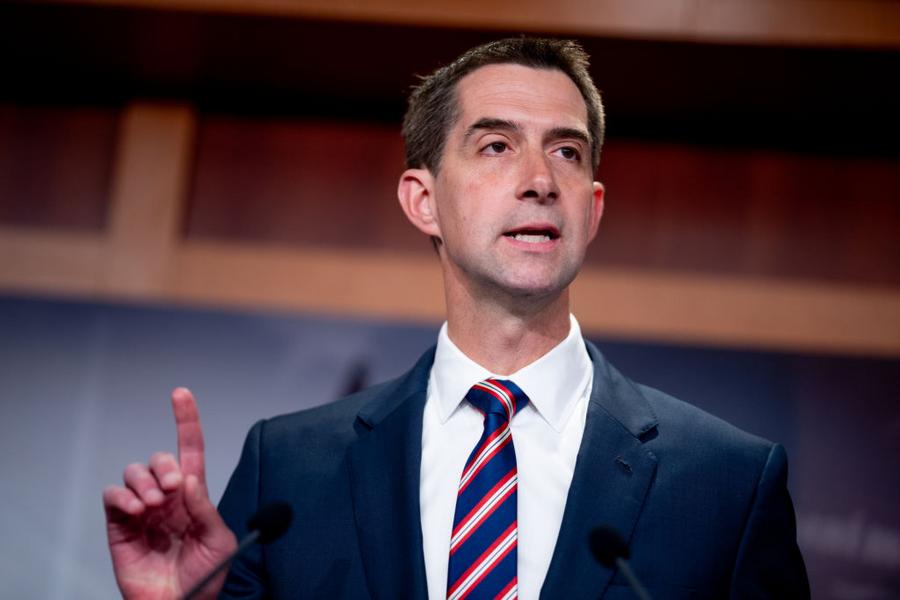What is Tom Cotton's net worth and salary?
Tom Cotton is an American politician who has a net worth of $500 thousand. Tom Cotton is a United States Senator representing Arkansas since 2015, rising quickly in Republican politics after a distinguished military career. Cotton grew up on his family's cattle farm before attending Harvard University for his undergraduate studies and Harvard Law School. Following the September 11, 2001 attacks, Cotton left his legal career to join the U.S. Army, serving as an infantry officer rather than a military lawyer. He completed combat tours in Iraq with the 101st Airborne Division and in Afghanistan with a Provincial Reconstruction Team, while also serving with The Old Guard at Arlington National Cemetery between deployments. Before entering the Senate, Cotton served one term in the U.S. House of Representatives (2013-2015) and worked briefly for McKinsey & Company. Known for his hawkish foreign policy positions and conservative stances on domestic issues, Cotton has become an influential voice in the Republican Party and currently serves as the chairman of the Senate Republican Conference, the third-ranking position in Senate Republican leadership.
Salary & Financial Disclosures
According to his most recently released financial disclosure, Cotton estimated his net worth at $500,000. In the years when he has given estimates, his net worth has fluctuated from $250,000 to $500,000.
Senator Tom Cotton earns an annual salary of $174,000, consistent with the standard pay for rank-and-file U.S. senators. This salary has remained unchanged since 2009, as Congress has repeatedly voted to decline automatic cost-of-living adjustments.
Early Life and Education
Cotton was born on May 13, 1977, in Dardanelle, Arkansas, where he was raised on his family's cattle farm in Yell County. His upbringing in this agricultural setting instilled values of hard work and discipline that would later define his career. After graduating from Dardanelle High School, Cotton pursued higher education at Harvard University, where he earned his bachelor's degree in 1998. He continued his studies at Harvard Law School, graduating in 2002.
Following his education, Cotton clerked for the U.S. Court of Appeals for the Fifth Circuit and briefly worked in private law practice. However, the trajectory of his career changed dramatically after the September 11, 2001 terrorist attacks, which occurred during his final year of law school.
Military Career
Motivated by the 9/11 attacks, Cotton made the significant decision to leave his legal career and enlist in the U.S. Army in 2005. Rather than serving as a military lawyer, a role that would have aligned with his legal background, Cotton chose to become an infantry officer and underwent ranger training.
Cotton served nearly five years on active duty, completing combat tours in both Iraq and Afghanistan. In Iraq, he served with the prestigious 101st Airborne Division, while in Afghanistan, he worked with a Provincial Reconstruction Team. Between these deployments, Cotton served as a platoon leader with The Old Guard at Arlington National Cemetery, the unit responsible for conducting military funeral honors.
His military service earned him several decorations, including the Bronze Star Medal, the Combat Infantryman Badge, and the Ranger Tab, reflecting his commitment and valor during his service.

(Photo by Andrew Harnik/Getty Images)
Political Rise
After leaving active military service, Cotton worked briefly as a management consultant for McKinsey & Company before entering politics. His political career began in 2012 when he was elected to represent Arkansas's 4th congressional district in the U.S. House of Representatives.
Just two years later, in 2014, Cotton successfully challenged Democratic incumbent Mark Pryor for a U.S. Senate seat, becoming one of the youngest members of the Senate at the time. He was re-elected to a second term in 2020, demonstrating his continued support among Arkansas voters.
Cotton's rapid ascension in Republican politics has been notable. He currently serves on several key committees, including the Armed Services Committee, the Intelligence Committee, and the Committee on Energy and Natural Resources. In 2024, he was elected as Chairman of the Senate Republican Conference, making him the third-ranking Republican in Senate leadership.
Policy Positions and Influence
Cotton has established himself as a prominent conservative voice, particularly on national security and foreign policy issues. He has been an outspoken critic of Iran, playing a significant role in opposition to the Iran nuclear deal during the Obama administration and supporting its withdrawal under President Trump.
On domestic policy, Cotton has maintained consistently conservative positions. He has advocated for stricter immigration policies, strong Second Amendment protections, and tough-on-crime approaches to criminal justice. He notably opposed the FIRST STEP Act, a bipartisan criminal justice reform bill that passed in 2018.
Cotton's willingness to take controversial stances was highlighted in 2020 when he wrote an op-ed calling for military deployment to quell civil unrest during protests following the death of George Floyd. The publication of this piece sparked significant debate about appropriate responses to domestic protests.
Personal Life
Despite his public profile, Cotton maintains a relatively private personal life. He is married to Anna Cotton, and they have two sons named Gabriel and Daniel. Cotton's 2019 book, "Sacred Duty: A Soldier's Tour at Arlington National Cemetery," reflects on his time serving with The Old Guard and explores the traditions and significance of Arlington National Cemetery.
Cotton's combination of elite education, military service, and political acumen has positioned him as an influential figure in American politics. With his leadership role in the Senate Republican Conference and continued visibility on key national issues, Cotton remains a significant voice in shaping Republican policy and strategy for the future.










 Bengali (BD) ·
Bengali (BD) ·  English (US) ·
English (US) ·